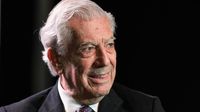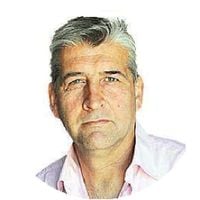Mario Vargas Llosa, the celebrated Hispanic-Peruvian writer and Nobel Prize laureate in Literature, passed away on Sunday, April 13, 2025, at the age of 89 in Lima, Peru. His death marks the end of an era for Latin American literature and has sent shockwaves throughout the literary community and beyond.
Vargas Llosa's passing was confirmed by his son, Álvaro Vargas Llosa, who shared that the family was by his side during his final moments. The family stated in a heartfelt message, "He died peacefully with his family." They also announced that there would be no public ceremony to honor the literary giant, respecting his wishes for privacy.
The news of his death elicited a wave of tributes and reflections from literary figures and politicians alike. Álvaro Pombo, the 2024 Cervantes Prize winner, remembered Vargas Llosa as a "humanista universal," highlighting his profound impact on literature and culture. Pombo emphasized Vargas Llosa's elegance and tolerance in a world where many writers succumb to dictatorial tendencies.
Álvaro Vargas Llosa expressed his sorrow, stating, "Peru has lost one of its best men," adding that his father left behind a remarkable legacy that will be cherished by many. The family has received condolences from across Latin America, the United States, Asia, and Europe, reflecting Vargas Llosa's global influence.
The President of Peru, Dina Boluarte, visited the family home to pay her respects. Accompanied by several ministers, Boluarte expressed her condolences and coordinated with the family regarding a national mourning declaration. The government subsequently declared April 14, 2025, as a day of national mourning, with flags at half-mast across public buildings and military installations.
Vargas Llosa was a pivotal figure in the Latin American literary boom, alongside contemporaries like Gabriel García Márquez and Julio Cortázar. His works, including "La ciudad y los perros" and "La fiesta del chivo," not only captivated readers but also explored the complexities of power and the human condition. The Swedish Academy, which awarded him the Nobel Prize in Literature in 2010, described him as "the heart" of the Latin American boom, noting his rich narrative style and diverse genres.
His literary contributions were celebrated not only for their artistic merit but also for their social and political commentary. The Instituto Cervantes, the Fundación Princesa de Asturias, and various cultural institutions mourned his loss, acknowledging his role in enriching the Spanish language and literature.
In the wake of his death, many have reflected on Vargas Llosa's legacy. Teresa Imízcoz, director of the UNED Pamplona center, regarded him as one of the great Latin American writers of the 20th and 21st centuries. Javier de Navascués, a professor at the University of Navarra, stated that Vargas Llosa was instrumental in disseminating Latin American literature globally.
As tributes poured in, former Spanish Prime Minister José María Aznar lamented Vargas Llosa's passing, calling him an "incansable defensor de la libertad" (tireless defender of freedom) who consistently raised his voice against totalitarianism. Aznar shared personal memories of their friendship and highlighted Vargas Llosa's commitment to democratic values.
In addition to political figures, fellow writers and artists also shared their condolences. Aitana Sánchez Gijón, who performed alongside Vargas Llosa in the play "Los cuentos de la peste," remembered him as a "dear friend" and expressed her sadness over his loss. The literary community is united in grief, recognizing the void left by his departure.
Vargas Llosa's literary journey began in the 1960s, and his works often blended personal experience with broader societal issues. His novel "La fiesta del chivo," which recounts the assassination of Dominican dictator Rafael Trujillo, is frequently cited as one of his masterpieces, showcasing his ability to intertwine historical events with fiction.
Carola Sbriziolo, a professor at the Public University of Navarra, emphasized Vargas Llosa's belief in literature's power to decipher life’s complexities and adversities. She noted that his works encourage readers to imagine and strive for better worlds, reflecting his deep understanding of the human experience.
Ignacio Lloret, another writer, pointed out that Vargas Llosa transformed the realities of Latin America into compelling narratives, exploring the dynamics of power and authoritarianism through innovative storytelling techniques. His use of multiple perspectives and non-linear narratives set him apart in the literary landscape.
As the literary world mourns, the Instituto Cervantes announced plans to publish the "Diccionario Vargas Llosa," a tribute to the writer's influence. This initiative invites 100 writers to contribute a word that encapsulates Vargas Llosa's essence, further solidifying his legacy in the literary canon.
Vargas Llosa's influence transcended literature; he was a cultural icon who believed in the transformative power of words. His belief that literature should challenge and provoke thought resonates with readers and writers alike. He once stated, "When reality becomes irresistible, fiction is a refuge. A refuge for the sad, the nostalgic, and the dreamers." This sentiment encapsulates the enduring power of his work.
In the coming days, Vargas Llosa will be remembered privately, as he wished. His literary contributions, however, will continue to inspire generations of writers and readers. His rich prose, complex characters, and insightful commentary on society ensure that his legacy will endure long after his passing.
Mario Vargas Llosa leaves behind a profound legacy, not just as a writer but as a thinker who challenged the status quo and inspired countless individuals to engage with the world around them. His passing marks a significant moment in the history of literature, and his voice will be missed.






